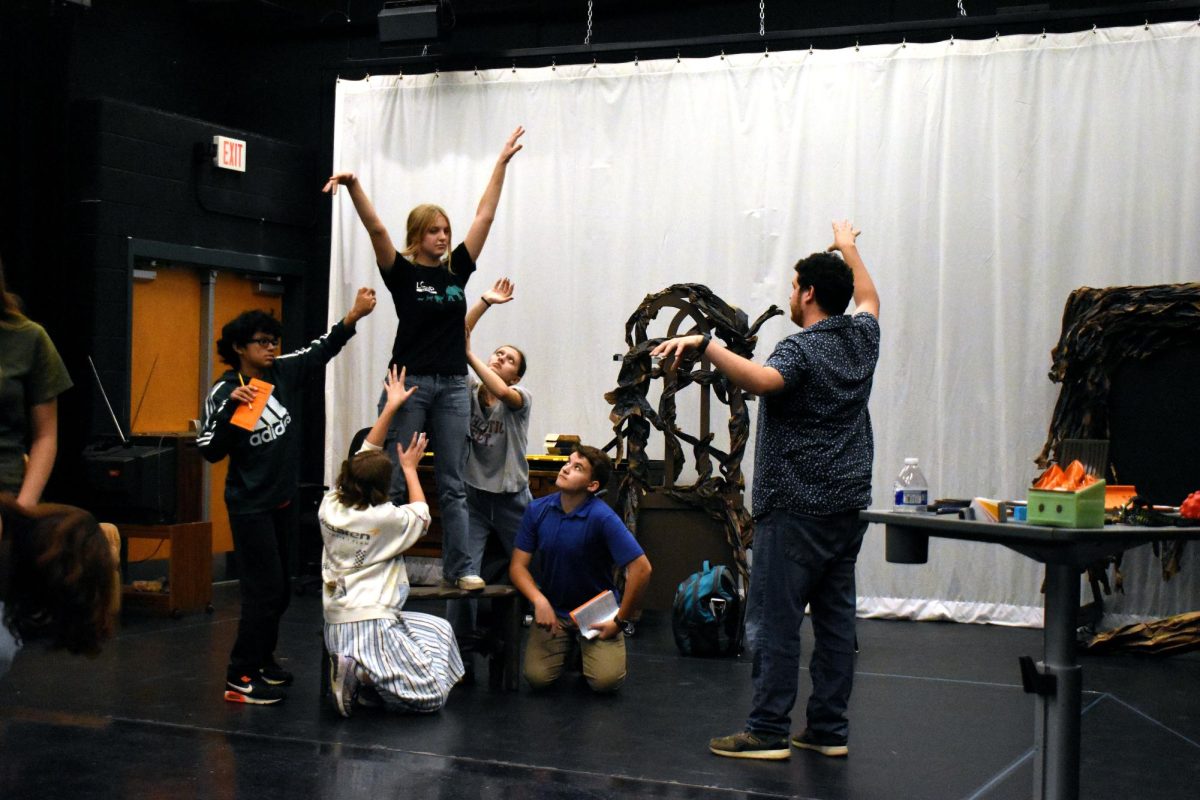Reading in the digital age: an activity that’s expanded to online spaces with e-books and sites such as AO3 — has simultaneously caused a widespread disenchantment with reading for k-12 students.
A multi causational issue.
“I just think we don’t teach stamina anymore,” English teacher Leslie Perry said.
Starting in 2002, Perry has spent most of her 23 years as an educator teaching higher level, AP or DE, English.
“After my first five years of teaching, when SOLs across the state started to massively dip and we had more failures, was when I noticed the decline.”
On the topic of SOLs, English teacher Christopher Humenik, who teaches AP Lang and Eng 9 Honors, feels that part of the issue lies within the tests itself.
“These tests stress very short readings to answer surface level questions,” he said. “When instruction skews there, you get instruction reinforcing the decline.”
Still, Humenik finds that teachers and curriculums can only do so much to encourage reading stamina, placing responsibility on the individual student.
“Reading is the same as any type of exercise; you must do it regularly and with intent to recognize gains,” Humenik said.
Classrooms have also been lowering their standards parallel to students’ decreasing motivation.
“In social sciences or science classes, there’s not as much textbook readings, as a lot of things are put on slides and summarized for us,” senior Kailey Renehan said. “They summarize it for you, you don’t have to think about it, you just have to write it down.”
Renehan’s lifelong hobby of avid reading has translated to her current job at Middleburg Books.
The desire for information in quick and digestible bites is a widespread consequence of the online world and social media. This, paired with teachers summarizing dense texts in English class beforehand, contributes to a lack of motivation to deeply read or analyze them.
“I also think the way that teachers were teaching, they would come in and act like ‘I’m the sage on the stage, so I’m going to tell you everything about that book that you were supposed to analyze and write about, and how to interpret it,’” Perry said.
While declining literacy rates has been a steady process sparked by the digital age’s emergence decades before, Covid-19’s temporary hindrance to in-person learning played a large role in sparking declines.
“I hate to blame it on Covid, but I saw it in my brother who is a freshman this year,” Renehan said. “Going into middle school online, there wasn’t as much of an emphasis on reading.”
Both Renehan and her younger brother were readers in elementary school, participating in reading logs and book clubs that boosted motivation to continue reading out of the classroom.
With online schooling during Covid, however, those expectations became nonexistent, and so did her brother’s habit of reading.
What are the entailed consequences?
“What I saw from him was mostly a lack of motivation and push that led to less focus and more reluctance to read in class,” Renehan said. “I would say my brother is mostly over it, although it is hard to get out of bad habits, so reading for fun is not always his strong suit.”
Decreased stamina and shortened attention spans aren’t the only effects of declining literacy rates.
“Vocabulary is much less expanded now than it was 15 years ago,” Perry said.
Citing vocabulary as one, Renehan stresses reading as a catalyst for a multitude of skills.
“Yes, reading is reading, but reading has different inherent skills such as critical thinking, focus, time management and things you need for your other classes,” she said.
Curriculums have borne the brunt of reduced literacy rates as well, Perry having to greatly reduce the amount of content taught in her classes over the years.
“We could get through three plays, easily multiple sonnets and at least four novels a year. That’s just not possible anymore,” she said.
What are the plausible solutions?
While reading proficiency is largely an individual issue, teaching students as young as in elementary school to read consistently is essential in building an unbreakable habit.
With her non profit organization: StoryBook Treasures, Founder and President Denise Corbo does just that by emphasizing the role of parents to instill reading in their children early on.
“StoryBook Treasures emerged from my passion for sharing this successful program with other educators, enabling children to truly fall in love with books, enhance family reading engagement and improve literacy scores,” Corbo said.
StoryBook Treasures was established by Corbo in 2014, and works with kids from Pre-K to 5th grade. By offering young students reading materials and an exposure to literature, the non-profit has been able to foster lifelong reading habits both in and out of the classroom.
Corbo’s organization has been essential in aiding impoverished kids who lack reading materials needed to foster those habits to begin with.
“They often lack access to books at home and miss out on the daily experience of reading and sharing their thoughts with family members,” Corbo said.
Encouraging reading in kids from the get-go helps to instill lifelong habits, but for older highschool students who currently lack the motivation, there are still ways teachers can re-establish leisurely reading.
“Allow choice when and where you can,” Humenik said. “If you hate sci-fi and I pop ‘Red Rising’ in front of you, which the entirety of America should read, you are reluctant at best and simply not going to read it at worst.”
Outside of the classroom, Renehan emphasizes audiobooks if one is out of the loop of traditional reading.
“It’s like a podcast,” she said. “Just hearing different words and sentence structures through audio can improve your reading scores.”
The impacts social media has had on reading and literacy rates has shown to be a double-edged sword. The better side offers a wide variety of choice in online texts, both short and dense, allowing for students to willingly build up that habit again.
“We’re like ‘well, whatever we do to hold their interest, if it’s high interest, let’s go that route.’ But sometimes high interest is less difficult,” Perry said.









